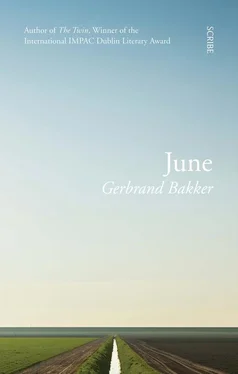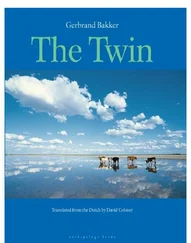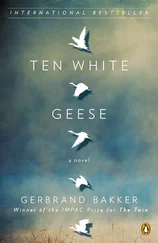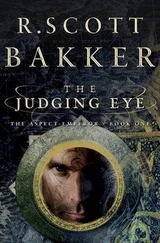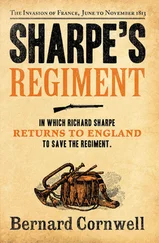‘What are you doing?’ her private secretary asks.
Without replying, she waits for the woman to reach her.
‘The time,’ Röell says. ‘We have to watch the time.’
Then the woman is standing opposite her, a little short of breath from hurrying.
‘Were you too late leaving home?’ she asks.
‘Yes, I…’
‘What an adorable little girl you have. What’s your name?’
The child, two at most, looks at her with big blue eyes.
‘Will you tell me? What your name is?’
‘An-ne,’ the child whispers.
‘Hanne,’ her mother says.
She pulls off her right glove to stroke the child’s cheek. ‘The “h” isn’t easy.’ The girl shrinks away, pressing her face against her mother’s neck. ‘And you are?’
‘Anna Kaan, ma’am.’
Ah, this woman knows how things should be done. ‘Did the time run away with you this morning?’
The woman looks at her, her startled expression making way for a smile. She doesn’t answer. The bicycle, leaning against the woman’s hip, slowly slides down and clatters onto the asphalt.
The Queen instinctively reaches out with both hands.
‘It’s fine,’ the woman says.
‘We have to go,’ says Röell, standing somewhere behind her.
It’s turned into a photo session after all. She doesn’t see it, she hears it. Annoyingly close by. Queen takes impromptu stroll. A second potential headline for tomorrow’s newspaper. ‘There you have it,’ she tells the woman. ‘We have to go. Bye, Hanne.’
‘Goodbye, ma’am,’ says the woman. ‘Thank you very much.’
‘What for?’
‘Taking the trouble to…’
‘It’s nothing,’ she says. When she turns, it’s not Röell but Jezuolda Kwanten standing behind her. Right behind her. She feels her warm breath on her face. It’s as if she’s trying to soak up every pore and imperfection in her model’s skin so that she can make her bronze bust as lifelike as possible. The sister from the Order of the Sisters of Charity takes a step aside and follows her to the cars, one pace behind.
She gives one last wave in the direction of the Polder House gates, where the mayor and his wife are waiting politely. Then all the car doors bang shut. Even before they drive off, Röell has gathered up all kinds of documents and started to ruffle through them. The Queen lights a cigarette. The car turns and drives through the village extremely slowly. When she looks to the right she sees a graveyard, just behind the Polder House. Something she neither noticed nor heard mentioned before. They pass a water tower and a pumping station. At the very edge of the village, at the foot of a dyke, there is a windmill.
‘Those goats,’ Röell says.
‘What about them?’
‘That’s really not done.’
‘Why not?’
‘With all due respect… goats!’
‘So?’
‘Who’s going to take them to Soestdijk?’
‘Van der Hoeven has arranged all that.’
‘And that woman with that child.’
‘She was late. That could happen to anyone.’
‘You can just leave things like that to run their course.’
‘I don’t want things like that to run their course. It’s just nice. For her and for that little girl. They’ll remember it for the rest of their lives, this beautiful sunny day in June.’ She draws on her cigarette. ‘Not to say that’s why I do it, of course.’
Röell purses her lips and looks through her papers.
‘Try to put yourself in those people’s shoes for once. What difference does a couple of minutes make?’
Röell doesn’t respond. ‘Eighteen forty-six,’ she says. ‘The polder is named after the consort of King Willem II.’
‘You don’t need to read that to me. What’s this one called?’
‘Warners.’
‘What’s on the programme?’
‘A waterskiing demonstration. At two thirty in the afternoon on the Oude Veer.’
‘Really?’
‘The fourth event is barefoot waterskiing.’
The Queen stubs out her cigarette, pulls her right glove back on and goes back to staring out the window. This area is again slightly different from the previous district. Different roads and farmhouses, less grass. If only that waterskiing was already over. They’ll have old-age pensioners there as well. If only Den Helder was over too. She’s looking forward to the Piet Hein , it’s been months since she was on the yacht. The polished pear wood, the green upholstered Rietveld armchairs, the bunks. Pappie, possibly, in the top bunk. And otherwise a quiet conversation — the drinks cabinet open — with Van der Hoeven. Tomorrow morning she might take the helm for a while, or at least stand at the captain’s shoulder. Two months from now she’ll be spending another few days on board for the naval review during the Harlingen fishing festival. ‘Barefoot skiing,’ she says. ‘What will they think of next?’
I’ll never celebrate anything again. Ever. What for? Celebrating your fiftieth wedding anniversary with only sons to show for it, what was I thinking? Never again. Straw’s nowhere near as hard as you’d think. If you want to sit or lie down on straw you have to know how. You have to rub against it like a cow or a sheep and keep rubbing until all the sharp stiff bits have turned away. I’m an expert: three-quarters of a lifetime’s experience with straw. It’s not just a couple of bales, there are hundreds of them. What’s all this straw still doing here anyway? What’s it for?
She’s lying on her back and staring up at the spot where a few roof tiles have slid down. It would have been different with a daughter. She wouldn’t have just sat there drinking and stuffing her face. She wouldn’t have made any snide remarks about the zoo where they spent the afternoon. She would have made a scrapbook with photos and stories; she would have written a song ‘to the tune of’, a funny song that rhymed and would have been sung by a lot more grandchildren than just that one, who made things even worse by sulking and answering back. A daughter would have squatted down next to her, next to her chair, to ask quietly if she was enjoying herself. Those horrible boys just drank and roared with laughter even though there was nothing to laugh about and all Zeeger did was join in, even if he didn’t drink. Zeeger never drank.
Through the hole above her, a ray of dusty sunlight shines into the barn at an angle. An angle that tells her that it must be late in the afternoon. Friday afternoon.
Earlier in the day, just before climbing up the ladder, she’d turned on the light. It’s still light now, but tonight it will get dark. She anticipated that. She pulled the rickety ladder up behind her, leant it against the straw to climb further, then pulled the ladder up behind her again. Lying on a pricklier bale of straw next to her are a water bottle, a packet of Viennese biscuits, a bottle of advocaat and the parade sword that normally hangs from the bottom bookshelf. The rickety ladder is a little further away.
Even though the side doors and large rear doors are all open, the air in the barn is motionless, not the slightest hint of a breeze. She sits up and grabs the water bottle, one and a half litres. While drinking, she looks at the junk in the milking parlour attic diagonally opposite the straw loft. A washing basket, bulb trays, a rusty boiler, roof tiles, an old coat (light blue), zinc washtubs, a pedal car, a crate with sacks of wool. The three round windows with the wrought-iron frames — one up near the roof ridge, the other two a good bit lower down, above the doors at either end of the long corridor that runs the whole length of the barn — remind her of a church. Tiles have come loose all over the place and, despite the spare tiles she’s just seen, they haven’t been replaced. In those spots, stripes of sunlight shine in.
Читать дальше
